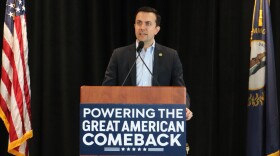Five new members will be inducted into the Kentucky Writers Hall of Fame this spring.
The institution – created by Lexington’s Carnegie Center for Literacy and Learning in 2012 – recognizes Kentucky writers whose work “reflects the character and culture” of the commonwealth and educates Kentuckians about the state’s literary heritage.
A Thursday release from the Carnegie Center announced the 2023 inductees.
Marsha Norman
Marsha Norman is an award-winning playwright, screenwriter and novelist whose work has garnered a Pulitzer Prize, multiple Tony Awards and many other accolades.
Norman grew up near Audubon Park in Louisville with her parents and three siblings. Many of her plays are about family dynamics and relationships. She graduated from Agnes Scott College in Decatur, Georgia, and earned a master’s degree from the University of Louisville. She wrote for the Louisville Times and Kentucky Educational Television and worked as an educator in Jefferson County.
She’s written 14 stageplays, including her Pulitzer Prize-winningdrama ‘night, Mother. She’s won two Tony Awards for her musicals The Secret Garden and The Color Purple.
Suzan-Lori Parks
Playwright, musician, novelist, essayist and performer Suzan-Lori Parks was the first African-American woman to win a Pulitzer Prize for drama.
Parks is a native of Fort Knox, where she was one of three children born to a career Army officer and an educator. Her youth was spent in Kentucky, West Germany, California, North Carolina, Texas and Vermont. Parks studied at Mount Holyoke College under James Baldwin, who encouraged her to become a playwright. He would later call her “an utterly astounding and beautiful creature who may become one of the most valuable artists of our time.”
Her play Topdog/Underdog won the Pulitzer Prize for drama in 2002. Park has written more than a dozen stageplays and radio plays. Her work also includes a number of screenplays, including Spike Lee’s Girl 6 and Lee Daniels’ The United States vs. Billie Holiday.
Richard Taylor
Richard Lawrence Taylor’s poems, novels and nonfiction works have evoked the colorful history and landscape of the commonwealth for decades.
Taylor is a sixth-generation Kentuckian who lives near Frankfort. He’s written 12 books of poetry, two novels and four books of nonfiction. He conducted his undergraduate English studies at the University of Kentucky before earning his Master’s degree in English from the University of Louisville. He also completed a law degree at U of L and a Ph.D. in English from UK. He went on to teach at several Kentucky institutions, including Kentucky State University and Transylvania University.
Taylor served as Kentucky’s poet laureate from 1999 to 2001. The first of his 12 poetry collections, Bluegrass, was published in 1975.
Madison Cawein
The Romantic poems of Madison Julius Cawein captured the natural beauty of Kentucky.
Cawein hailed from Louisville, where he was born in 1865. He lived in rural Oldham County and in New Albany, Indiana, during his youth before attending Male High School, where he was selected “class poet.”
His work often drew comparisons to British poets Percy Shelley and John Keats, earning him the nickname the “Keats of Kentucky.” A year before his death – in 1913 – Cawein published a poem called "Waste Land" in a Chicago magazine that would go on to be identified as a key inspiration for T. S. Eliot's landmark poem “The Waste Land” – the 1922 work often considered the birth of modernism in poetry.
Blanche Taylor Dickinson
Blanche Taylor Dickinson was poetry, short story writer and journalist whose work in journals, newspapers and magazines during the 1920s has been widely anthologized alongside other Black poets of the Harlem Renaissance movement.
Born in Franklin in 1896, Dickinson attended segregated schools in Simpson County, Bowling Green Academy and Simmons College in Louisville and taught for several years in Black schools.
Much of Dickinson’s work examined the difficulty of Black women’s lives in the 1920s, commenting on racism, class, patriarchy and standards of beauty determined by white culture. One of her earliest published poems appeared in the local newspaper, The Franklin Favorite, in July 1925. She was among a number of Black writers and artists featured in the magazine Opportunity: A Journal of Negro Life, which awarded her its Buckner prize for “conspicuous promise.”
An induction ceremony will be held on Mar. 23 at the Kentucky Theatre in Lexington.
Since 2012, 56 people have been inducted into the hall. That includes novelists, historians, essayists, poets, playwrights, journalists, critics and other literary figures connected to Kentucky like Robert Penn Warren, bell hooks, Thomas Merton, Hunter S. Thompson, Wendell Berry, Irvin Cobb, Sam Shepherd, Bobbie Ann Mason and many others.
Inductees – which must be published writers, someone whose writing is of “enduring stature” and connected to the state of Kentucky – are chosen by Carnegie Center and Kentucky Arts Council committees.
In a sea of partisan news, WEKU is your source for public service, fact-based journalism. Monthly sustaining donors are the top source of funding for this growing nonprofit news organization. Please join others in your community who support WEKU by making your donation.





